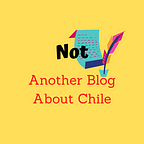Use These Words To Successfully Communicate in Chile
A short class-based guide to assimilating linguistically in Chile
Did you know that Chilean Spanish is way different in pronunciation than classical Spanish? And moreover, the Chilean Spanish itself is divided depending on the social class the speaking person comes from?
So if you come to Chile and don’t understand 60% of what is being said, don’t worry, you are not alone.
To help you, we have prepared a short dictionary of words that distinguish Chilean Spanish between high and low classes, so you could feel like a fish in the water when communicating with your counterparts.
The High-Class Spanish
Zorron (little fox)— a young male representative of the higher class. Curiously enough, this word, when pronounced between the mentioned circle, is not offensive. But when a non-zorron calls a zorron by this word, it perceives as an offense. It is an affront against the whole higher class. In such a situation, the offender mentions the word zorron out of resentment.
Perro (dog) — a funny form in which young male representatives of the higher class name each other. A word used among friends.
Pichanga — football.
Pollera — skirt. If you want to say mini-skirt, you just say mini.
To drink tea — afternoon tea.
Anteojos — glasses. Don’t you even dare calling glasses lentes or you will be automatically categorized as of low-class provenance. This is a barometer-word that shows your background. When you start learning Spanish, please forget about the word lentes, begin using the word anteojos as early as you can. Believe the author, she has the sin of committing this mistake, rapidly correcting it.
Matrimonio — wedding.
El chaleco — vest. Here you must remember that chaleco is el, not ella.
Comer (eat) and comida— to have supper. Don’t use the word cenar or cena.
Tomar desayuno — to have breakfast. The author fails to know why the higher-class people say tomar desayuno, but they don’t say desayunar (verb).
Marido — husband, mujer — wife. When talking about his wife, a man must say she is my “señora”.
Guagua — baby.
Another tip is not using diminutive. For example, instead of saying pancito, tecito, papi, mami, hijito, you must say pan, té, papá, mamá, hijo. The diminutive form is a sign of low origin.
If you want to live this distinction beforehand, watch this video named Escuela de Zorrones.
The Lower-Class Spanish
Once — afternoon tea. We explained this phenomenon in this article. If you want to show affiliation with the lower or popular class, you can openly and proudly use once.
Falda — skirt. As we said earlier, the higher class uses the word pollera.
Lentes —glasses. God forbid you to mention this word in front of some higher-class representative.
Boda — wedding.
Esposo — husband, esposa — wife.
Cenar — to have supper.
Bebé — baby.
Tip: the lower-class representatives tend to call their children Usted, meaning the T-V or pronoun distinction, here used as the V form.
Notice that this dictionary came with experience, the trials and errors of the author’s adventures in Chile.
We will be adding more words and phrases when they arise.
And you, do you have any suggestions?
